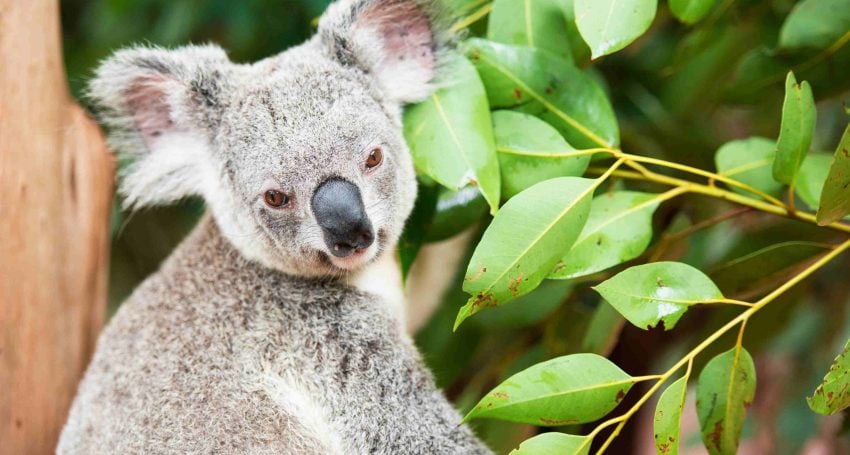Australia’s Overshoot Day in 2022 is Wednesday 23 March
Features
“And so, it comes back to how well we honour our relationships. The principle of loving one’s neighbour invites us to approach the planet with a different framing. At its heart, loving one’s neighbour involves acknowledging that we are connected to one another. My welfare and yours are interdependent. And we both cannot truly flourish unless the koala does, too,” says The Very Rev’d Dr Peter Catt

When it comes down to it, most of the problems we face can be traced back to a failure to attend well to relationships. That failure can usually be framed in terms of not observing the Golden Rule – love your neighbour as yourself or do unto others as you would have them do to you.
This core teaching of most religions holds that we owe a duty of care to one another. Obviously that duty of care extends into the future. It is not time-limited. This makes the Federal Government’s argument in its appeal to The Federal Court, that it doesn’t owe a duty of care to the young people of today, a nonsense. It also points to the inadequacy of our environmental, and therefore our human protection laws. If we don’t care for the planet, we cannot be caring for people either.
In its appeal the Government argued that it doesn’t have to consider the future harm that will be caused to the young people of today by the climate change it is cynically working to bring about. Harm it is subsidising fossil fuel companies to accelerate.
Whilst the dangers that our young people will face from climate change are deeply troubling, we need to acknowledge that the focus on dealing with climate change is masking an even more significant threat to our young people’s futures.
That deeper challenge is what is known as “Earth Overshoot”.
On Wednesday March 23 we will achieve the annual milestone that highlights the extent of this more significant threat. March 23 is Australia’s Overshoot Day.
Overshoot Day is the day in the year when a full year of the Earth’s regenerative output is consumed by humanity. The human family as whole consumes a year’s worth of the Earth’s production by late July. This means that from August until New Year, humanity lives by using up the Earth’s “capital”. Year by year we are therefore depleting the Earth.
Advertisement
Australians consume the planet’s resources at a much higher rate than most of humanity. We reach our Overshoot Day in March. Australians are consuming the planet four times faster than it can regenerate.
Some of the measures we are using to deal with climate change exacerbate the Overshoot problem. These are the solutions that see us consuming even more of the earth’s resources.
A local council in Northern NSW has accepted that climate change is not only real, but will result in drier seasons. In response to this news, the council has resolved to build a new dam to sure up water supplies for its citizens. The preferred site for the dam will see the obliteration of the most significant piece of koala habitat left in the area.
In Queensland, a virgin forest is being cleared for a wind farm.
Under current arrangements most solar panels will end up in landfill at the end of their useful life rather than being recycled. Valuable resources mined and processed at great energy cost treated as rubbish.
Our incapacity to live within the Earth’s means suggests that we need to examine our approach to the planet. If you like, we need to revisit our understanding of our relationship to the planet.
Advertisement
We have tended to see the Earth, and ‘nature’, as things from which we are separate. Nature is all the other creatures and the places where they live. We are not behaving as though we are part of nature. We insulate ourselves from it and think that we live apart from it. Climate control in our homes, workplaces and shopping centres has accentuated this sense of separation, as has the bubble of the car, through which we experience much of the planet. The feeling of being separate often gives us a sense of mastery over planet and its creatures. They are ours to use as we please.
This sense of separation and mastery has resulted in us applying simple solutions to the challenges we face as we seek to live on this planet.
One such simple solution, that Overshoot Day reveals as unsustainable, has been applied for centuries. This solution has seen us clear or flood land as if such practices are without consequence. This practice has been driven by simple, yet erroneous assumptions – the supply of land is limitless, and if it isn’t being used for a human-centred purpose it is going to waste.
We are beginning to see that this approach to land is not so much a problem solver as a problem exacerbator. The clearing of the Amazonian rainforest has reached the point where that once huge system will soon cease to be a climate moderator and a carbon storehouse for the planet. Land clearing in Australia is a source of carbon pollution and is threatening some of our most loved species. The Great Barrier Reef is bleaching yet again.
Recent and ongoing events give us a foretaste of what life will be like unless we arrest the degradation of the planet and deal with climate change.
The recent “rain bomb” that affected much of the east coast of the country will have long-term effects on the health of communities and people. Some people affected may never again have access to stable housing.
The long-running civil war in Syria has been attributed in part to the effects of climate change. A long-tern drought caused the dislocation of the rural population, whose arrival in the cities disrupted the urban areas. The medium terms effects of climate change could see up to 1 billion people displaced.
Consuming the Earth faster than it can regenerate can only lead to resource depletion with increased scarcity leading to conflicts.
And so, it comes back to how well we honour our relationships. The principle of loving one’s neighbour invites us to approach the planet with a different framing.
At its heart, loving one’s neighbour involves acknowledging that we are connected to one another. My welfare and yours are interdependent. And we both cannot truly flourish unless the koala does, too.
The policies that both major parties are taking to the election are inadequate both for dealing with climate change and for winding back overshoot. As we observe Australia’s Overshoot Day, let us demand of them something better. Something better for the planet and better for our kids to whom they most definitely owe a duty of care.
Editor’s note: Join people of faith in a prayer vigil outside the electoral office of Trevor Evans MP, Member for Brisbane, at 349 Sandgate Rd, Albion at 10.30am on Wednesday 23 March, Australia’s Overshoot Day. For more information and to register, visit the Facebook event page.
The Social Responsibilities Committee, Angligreen and St John’s Cathedral also invite you to a short liturgy at 12 noon on Wednesday 23 March when the Cathedral bells will toll as gatherers light candles, pray and commit to work together for a more sustainable planet.






